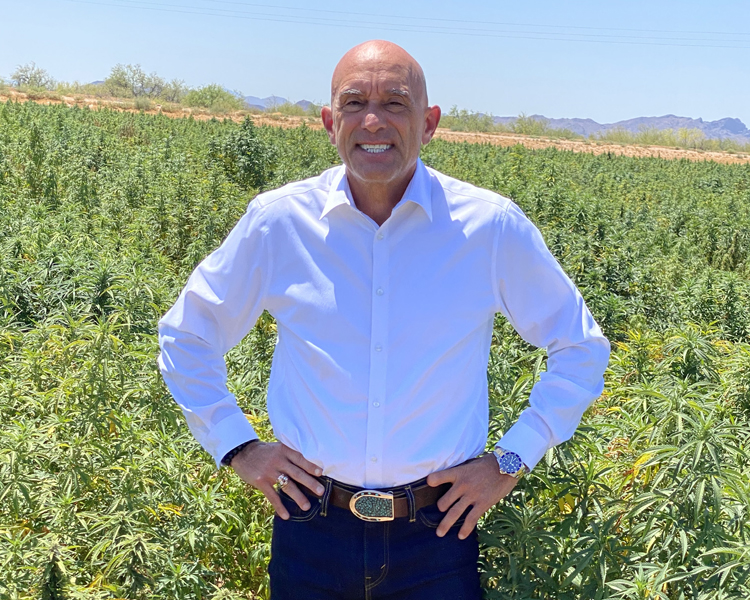The opportunities available in the burgeoning cannabis, hemp, and marijuana-growing industry were obvious to Brian Foster. The veteran Valley attorney has worked on many cases involving the industry, and he learned first-hand about the potential that hemp growing businesses possess. Couple that knowledge with Foster’s farming roots as a young man growing up in Iowa, and a spark was lit.
However, in Foster’s former role as senior partner at Valley law firm Snell & Wilmer, he was unable to get involved in a cannabis or hemp business venture. So in December of 2019, when Foster left Snell & Wilmer after 32 years to become partners with Dennis Wilenchik, one of the first things he did was launch his industrial hemp growing company, Flor Grande.
“My introduction to cannabis has been as a cannabis attorney for many years helping my clients in the cannabis space and making my clients lots of money,” Foster said. “I wanted to get involved as a dispensary and cultivation site owner when Arizona was issuing medical marijuana licenses, but the law firm I worked for then would not allow it. I have always regretted not getting involved.”
“So, when Governor Ducey legalized the growing of industrial hemp last year, we rushed out and got a growing license.”
Foster grew up in a small Iowa town, Marion, and worked on a farm each summer growing up. He lost parts of two fingers at 13 while working on a farm, so agriculture is definitely something he has an attachment to. He went to high school in Marion and then college at the University of Iowa. He also earned his law degree from the University of Iowa. His Iowa roots always remained strong, even though he was making a very successful career in commercial litigation in Arizona as one of the top commercial real estate and business trial attorneys in the state.
“It’s ironic that 32 years after leaving Iowa and working as a top trial attorney all that time, I am returning to my Iowa farming roots,” Foster said.
Currently, Flor Grande has approximately 1.2 million industrial hemp plants growing on 250 acres in Casa Grande. The plants Flor Grande is growing are used to make CBD oil and other products and contains no THC, which is the main psychoactive compound in cannabis that produces the “high” sensation.
According to Foster, in 2019 CBD was a $4 billion industry and is expected to grow into a $25 billion industry by 2022. Demand has spiked recently because of the COVID-19 pandemic. CBD is used to treat depression, anxiety, insomnia, and pain. It is also used in foods, drinks, pet food, energy drinks, cosmetics, topical pain creams, pharmaceuticals, and many other products.
Foster said he has three other partners involved in Flor Grande, including a highly successful tech entrepreneur, a senior executive at a publicly-traded tech company, as well as a hemp industry expert.
Flor Grande has 500 acres available and Foster hopes that all of that acreage will be planted in 2021. The company has a team of many field workers along with a farm manager, agronomists and hemp consultants. The growing operation is closely monitored by cameras and security guards at night.
“There is a lot of up front money that has to go into an operation of this size,” Foster said. “It’s in the many, many millions.
“We’ve been told by multiple independent bodies who have looked at our crop that it is one of the top hemp farming operations in the state. So, we haven’t cut any corners and have spent the necessary money.”
The growing process began with field preparations in March. The plants started their journey in greenhouses in Colorado and New Mexico and were shipped in six semis in early April. The initial crop will be harvested in October, and the planting process will begin again.
“Because of Arizona’s unique climate, we will be able to plant multiple crops in a year, which is not possible in other states,” Foster said. Arizona is uniquely suited. It’s an ideal place to grow hemp. You can grow multiple crops in one year and you do not have to rotate them.”
At harvest, Foster said his plants will be shipped to three or four different processing facilities. That process, according to Foster, is also very costly, but he is very confident that the market value of the final product will be substantial.
Foster said the goal for Flor Grande is to continue to grow at a steady rate. He said he is approached often by land owners looking to partner with Flor Grande, but so far the company hasn’t brought in new partners.
“We’re trying to be real strategic about our growth,” Foster said. “We don’t want to get too far over our skis right now. But we’re looking to grow in all different areas.”
“We’re just looking toward October (and their first harvest). We don’t have any income source now, but the payout at the end should be substantial.”




